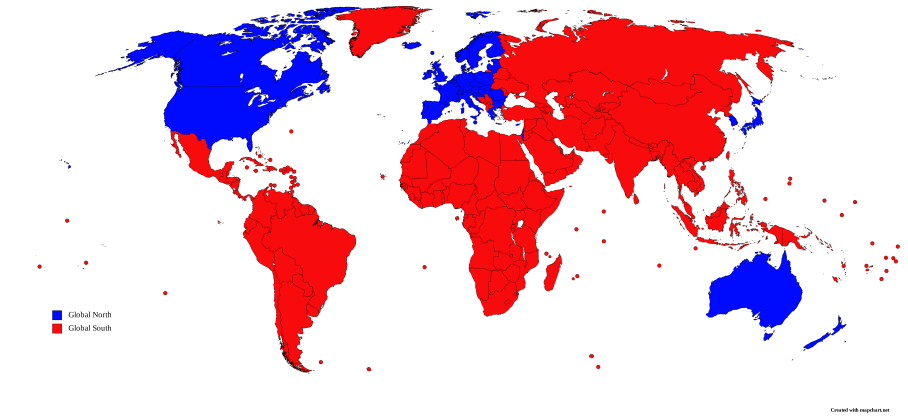More languages
More actions

In geopolitics, the Global South (sometimes abbreviated to GS) is a general term that roughly designates the economically exploited countries, in contrast, the Global North (GN) are the most advanced capitalist countries,[1] whose wealth was largely generated from their historical role in colonialism and their modern involvement in imperialism.[2]
It's important to note that as this is a geopolitical term, some leeway must be accounted for. For example, China is generally considered by financial institutions to be part of the South, despite them soon achieving the highest GDP in the world. Israel is considered to be part of the Global North, due to its close relationship with and its strategic importance to the Global North ex-colonial powers.[3]
The term Third World preceded it, first mentioned in Mao's Three Worlds Theory. The term "developing countries" is misleading, as it ignores the fact that the "developed" countries are the ones imperializing them: overexploiting and making them economically dependent on export/imports from or to the global north.[2]
In 1500, the average income in Europe was only three times higher than in Africa and Asia, but that difference grew to ten times by 1960.[4] In addition, in 1960, the richest 20 countries were 18 times as rich as the 20 poorest countries in terms of GDP per capita. This ratio grew to 37 times in 1995.[5]
References
- ↑ IGI Global Publisher Dictionary, "What is Global North/South?"
- ↑ 2.0 2.1 LENIN; Vladimir, Imperialism: The Highest Stage of Capitalism (Read on Marxists.org)
- ↑ Maps of the World, What is the division between the Global North and the Global South?
- ↑ Vijay Prashad (2008). The Darker Nations: A People's History of the Third World: 'Buenos Aires' (p. 66). [PDF] The New Press. ISBN 9781595583420 [LG]
- ↑ Vijay Prashad (2008). The Darker Nations: A People's History of the Third World: 'Conclusion' (p. 277). [PDF] The New Press. ISBN 9781595583420 [LG]
